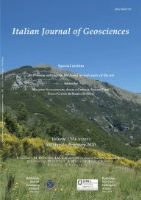
Italian Journal of Geosciences
Scope & Guideline
Innovative Research: Illuminating the Path of Geological Understanding
Introduction
Aims and Scopes
- Stratigraphy and Sedimentology:
The journal consistently publishes studies focusing on the stratigraphic analysis of sedimentary sequences, emphasizing the geological history and sedimentary processes in various regions, particularly in Italy. - Tectonics and Structural Geology:
Research on tectonic processes and structural geology is a core area, including studies on fault systems, tectonic evolution, and the impact of tectonics on sedimentation and landscape development. - Geochemistry and Petrology:
The journal includes significant contributions in geochemistry and petrology, exploring the chemical compositions of rocks and minerals, and their implications for understanding geological processes. - Paleontology and Biostratigraphy:
Papers often address paleontological findings and biostratigraphic correlations, providing insights into past biodiversity and the evolutionary history of life on Earth. - Geophysics and Geotechnics:
There is a strong focus on applying geophysical methods and geotechnical investigations to assess geological hazards, resource exploration, and environmental impacts. - Geological Mapping and Modelling:
The journal emphasizes the importance of geological mapping and 3D geological modelling, facilitating better visualization and understanding of geological structures and formations.
Trending and Emerging
- Digital Geoscience and Remote Sensing:
Recent publications increasingly focus on the application of digital tools, remote sensing, and photogrammetry in geological research, highlighting the importance of technological advancements in analyzing geological features. - Geohazards and Risk Assessment:
There is a notable uptick in studies addressing geohazards, including seismic risks and landslide assessments, indicating a growing concern for natural disaster preparedness and risk mitigation. - Environmental Geoscience and Sustainability:
Emerging themes around environmental geoscience, particularly studies related to resource management, pollution, and sustainable practices, reflect a shift towards integrating environmental considerations in geological research. - Interdisciplinary Approaches:
An increase in interdisciplinary studies that integrate geology with other fields such as archaeology, ecology, and engineering signifies a trend towards holistic investigations of geological phenomena. - Geological Heritage and Conservation:
Recent papers also highlight the relevance of geological heritage and its conservation, reflecting an emerging interest in the cultural and educational value of geological sites.
Declining or Waning
- Historical Geology:
Research related to historical geology, particularly studies focusing on ancient geological processes and formations, appears to be less prevalent in recent issues, suggesting a shift towards more contemporary geological studies. - Volcanology Studies:
Although volcanology has been a significant aspect of the journal, the frequency of papers specifically dedicated to volcanic studies has decreased, indicating a possible waning interest or a shift towards other geological themes. - Climate Change Impacts:
Papers directly addressing the impacts of climate change on geological processes and landscapes seem to be less common, which may reflect a broader trend in geological journals focusing on immediate geological phenomena rather than longer-term climate effects.
Similar Journals
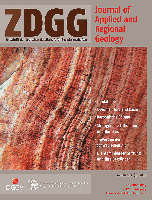
Zeitschrift der Deutschen Gesellschaft fur Geowissenschaften
Connecting Scholars: Insights into Planetary Science and EnvironmentZeitschrift der Deutschen Gesellschaft für Geowissenschaften is a prominent academic journal published by E Schweizerbart’sche Verlagsbuchhandlung, dedicated to advancing research in the field of Earth and Planetary Sciences. With its ISSN 1860-1804 and E-ISSN 1861-4094, this journal provides a platform for researchers to disseminate high-quality scientific articles and insights that contribute to our understanding of geological and environmental phenomena. Over the years, it has established itself as a reputable source within its category, holding a Q3 ranking among the Earth and Planetary Sciences (miscellaneous) journals in 2023, and achieving an impressive 85/195 rank in Scopus, placing it in the 56th percentile. The journal is published from Germany, specifically at Johannesstraße 3A, D 70176 Stuttgart, where it fosters a collaborative environment for scholars, professionals, and students alike. Although currently not an Open Access journal, it offers critical insights into various geoscience topics, making it an essential resource for those engaged in geological research and education. With its converged years stretching from 2008 to 2024, Zeitschrift der Deutschen Gesellschaft für Geowissenschaften is poised to continue its impactful role in the geosciences community.
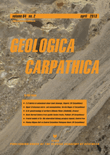
GEOLOGICA CARPATHICA
Unlocking the Secrets of the Carpathian RegionGEOLOGICA CARPATHICA, with ISSN 1335-0552 and E-ISSN 1336-8052, is a distinguished open access journal published by the Slovak Academy of Sciences Geological Institute, serving as a pivotal platform for the dissemination of research in the field of Geology. Established in 1991 and continuing through 2024, the journal is recognized for its significant contributions to Earth and Planetary Sciences, evidenced by its 2023 Scopus ranking placing it in the second quartile (Q2) within Geology. With an H-index that showcases its impactful publications, GEOLOGICA CARPATHICA is committed to fostering scholarly communication while promoting accessible research, having adopted an open access model since 2009. Located in beautiful Bratislava, Slovakia, this journal aims to engage a global audience of researchers, professionals, and students interested in ecological, geological, and environmental studies, making it a prominent resource for enriching the scientific community's understanding of the Carpathian region and beyond.

Boletin de Geologia
Advancing Geological Knowledge, One Article at a Time.Boletin de Geologia is a prominent open-access journal published by UNIV INDUSTRIAL SANTANDER, dedicated to advancing the field of Earth and Planetary Sciences. Since its transition to open access in 2000, this journal has provided a platform for researchers to disseminate their findings and engage with the global scientific community. With an ISSN of 0120-0283 and an E-ISSN of 2145-8553, it is indexed in Scopus and has secured a notable Q3 ranking in the category of miscellaneous Earth and Planetary Sciences as of 2023, reflecting the impact and relevance of its published articles. The journal's geographical scope, rooted in Colombia, allows it to highlight significant geological research pertinent to the region while also contributing to global discussions. Scholars and practitioners interested in innovative research within this field will find Boletin de Geologia an invaluable resource for unlocking knowledge and fostering collaboration in the geological sciences.

Journal of Geosciences
Fostering Interdisciplinary Dialogue in GeosciencesJournal of Geosciences is a distinguished peer-reviewed journal published by CESKA GEOLOGICKA SPOLECNOST, based in the Czech Republic, that serves as a vital platform for the dissemination of innovative research in the field of Earth and Planetary Sciences. With an ISSN of 1802-6222 and E-ISSN of 1803-1943, this journal has established its significance within the academic community, evidenced by its Q3 ranking in both Earth and Planetary Sciences and Geology. The journal covers a broad array of topics, making it an essential resource for researchers, professionals, and students interested in geoscientific advancements and discoveries. The Journal of Geosciences reflects a commitment to high-quality scholarship, embracing a variety of methodologies and interdisciplinary approaches, and provides open access to its content, thereby encouraging global collaboration and knowledge sharing among geoscientists. With a publication history converging from 2007 to 2024, it continues to be a prominent venue for critical conversations and developments in the ever-evolving field of geosciences.
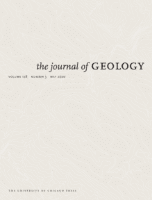
JOURNAL OF GEOLOGY
Fostering Dialogue in the Realm of Earth and Planetary Sciences.The JOURNAL OF GEOLOGY, published by University of Chicago Press, serves as a premier platform for disseminating groundbreaking research in the field of geology. Established in 1973, this esteemed journal has consistently ranked in the Q2 category in geology, further solidified by its Scopus ranking, where it is positioned at 99 out of 321 in Earth and Planetary Sciences, marking it in the 69th percentile of its category. With an emphasis on innovative and interdisciplinary studies, the journal features peer-reviewed articles that contribute to the understanding of geological processes, earth materials, and environmental interactions. Although it does not currently offer open access, it facilitates broad access through academic institutions to reach a global audience of researchers, professionals, and students striving to advance the knowledge of Earth's history and dynamics. As a vital resource for the geology community, the JOURNAL OF GEOLOGY plays an essential role in fostering scholarly dialogue and advancing both academic inquiry and practical applications in geology.
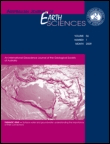
AUSTRALIAN JOURNAL OF EARTH SCIENCES
Innovating Our Understanding of Earth's ProcessesAustralian Journal of Earth Sciences, published by Taylor & Francis Ltd, has established itself as a leading journal in the field of Earth and Planetary Sciences since its inception in 1984. With an impactful reach reflected in its ranking as Q2 in the Earth and Planetary Sciences category, the journal contributes significantly to the advancement of knowledge through rigorous peer-reviewed research. While it is not Open Access, the journal ensures broad accessibility through institutional subscriptions and various academic platforms. With a commitment to covering diverse topics within the Earth sciences, including geosciences, geology, and environmental studies, the Australian Journal of Earth Sciences is an essential resource for researchers, professionals, and students seeking to deepen their understanding of the dynamic processes that shape our planet. Engaging with the journal means being part of a vibrant community that aspires to push the boundaries of scientific inquiry and innovation in Earth sciences.
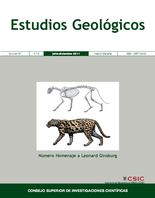
ESTUDIOS GEOLOGICOS-MADRID
Connecting Researchers with Earth’s Secrets Since 1976.ESTUDIOS GEOLOGICOS-MADRID is a prominent journal in the field of geology, published by the esteemed Consejo Superior de Investigaciones Científicas (CSIC) in Spain. Established in 1976, this Open Access journal has been a vital resource for researchers and professionals since its inception. With an impact factor reflecting its contribution to the Earth and Planetary Sciences community, ESTUDIOS GEOLOGICOS-MADRID currently holds a Q3 category ranking in Geology as of 2023, showcasing its relevance and quality within the discipline. The journal publishes a diverse array of geological studies, ensuring wide-reaching access to significant research findings, thereby promoting collaboration and knowledge sharing. Established as a platform for both foundational research and applied geology, this journal fosters academic growth and contributes to understanding the Earth’s processes. Researchers, professionals, and students are encouraged to explore its extensive archive, which includes publications from 1976 to the present. For more information, visit the journal's editorial office at Editorial CSIC, C/VITRUVIO 8, 28006 MADRID, SPAIN.

Geosphere
Advancing Earth Sciences through Open Access InnovationGeosphere is a premier open access journal published by the Geological Society of America, Inc., dedicated to advancing the fields of geology and stratigraphy. Since its inception in 2005, this journal has established itself as a critical platform for sharing high-quality research, evidenced by its robust positioning in the 2023 Scopus rankings, where it holds the 12th rank in stratigraphy and 75th in geology. With an impressive impact factor and a commitment to open access since 2018, Geosphere facilitates the dissemination of significant findings to a global audience, making it an essential resource for researchers, professionals, and students alike. The journal's scope includes a wide range of topics related to Earth and Planetary Sciences, encouraging interdisciplinary collaboration and innovation. Based in the United States, Geosphere continues to foster a community dedicated to understanding the Earth's processes and resources, ensuring that it remains at the forefront of geological research.

Journal of Earth Science
Connecting global minds through open access geoscience.Journal of Earth Science, published by the China University of Geosciences, Wuhan, is a leading journal in the field of Earth and Planetary Sciences, recognized for its significant contributions to the understanding of geological processes and environmental challenges. With an impressive Q1 ranking among Earth and Planetary Sciences journals and a strong position at Rank #39/195 in Scopus, this journal not only showcases high-quality research but also serves as a crucial platform for disseminating innovative findings, spanning a broad spectrum of topics from geophysics to climate change. The journal adopts an open access model, which enhances the visibility and accessibility of research articles published from 2009 to 2024, thereby facilitating collaboration and knowledge sharing among the global scientific community. With its commitment to advancing geosciences, Journal of Earth Science is invaluable for researchers, professionals, and students alike, eager to stay informed and contribute to ongoing discussions in this dynamic field.

GEOTECTONICS
Exploring Earth's Mysteries, One Tectonic Shift at a Time.GEOTECTONICS is a distinguished academic journal published by PLEIADES PUBLISHING INC, focusing on key developments in the field of geology. Established in 1978, the journal has dedicated itself to exploring the intricate processes and phenomena associated with Earth's tectonic systems, making substantial contributions to Earth and Planetary Sciences. With an impressive impact factor reflected in its Q2 ranking within the Scopus category of Geology, GEOTECTONICS stands out as a valuable resource for researchers, professionals, and students alike. The journal offers a platform for rigorous peer-reviewed research that spans both fundamental theories and practical applications in geosciences, affirming its significance in fostering academic discourse and advancing geological knowledge. Although it currently does not offer open access, the journal's accessible format and continued publication through to 2024 ensures that it remains at the forefront of geoscientific inquiry.